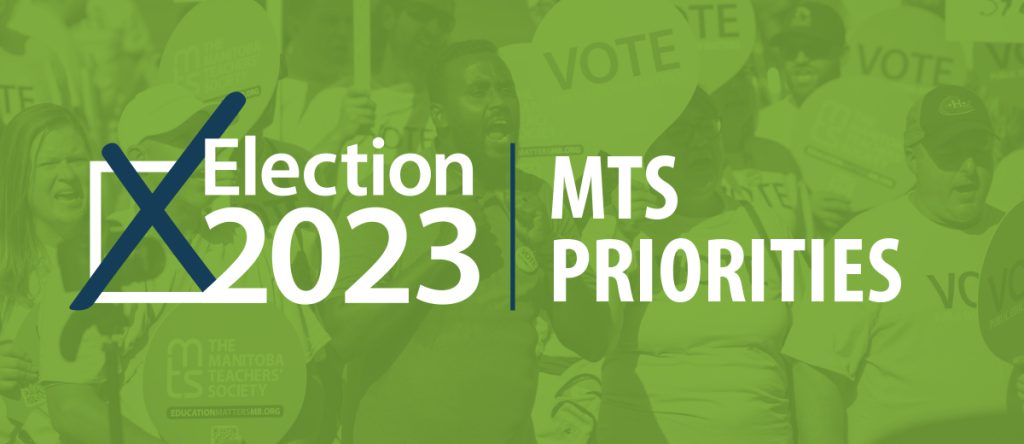
Over the past six years, the provincial government’s contribution to operating funding for public education has failed to keep pace with inflation.
As a result, the ability to effectively respond to growing student needs has been greatly diminished.
There are a variety of student needs that require support and enhancement to ensure positive outcomes, including but not limited to school nutrition programs, smaller class sizes, special education and youth mental health supports, reconciliation work in Indigenous education, student transportation, and French language education.
The Next Government Must
1. Provide adequate, equitable and stable funding to enable school divisions to provide quality public education to Manitoba students.
2. Provide annual operational funding increases that exceed the rate of inflation.
3. Provide additional funding to school divisions when mandating the implementation of provincial initiatives to eliminate the practice of offloading costs on to school divisions.
1. Establish a universal meal program for all school-age children. The program must be available for any school-age student at no cost to the student regardless of perceived need.
2. Work with the City of Winnipeg, other municipal governments in the province and any other applicable parties to establish a pilot project, offering bus tokens to students. The fare for public transportation should not be a barrier to accessing education.
3. Provide menstrual products free of charge in K-12 public schools and ensure that the menstrual products are available in female, male and gender-neutral washrooms. Funding must continue beyond the government’s three-year commitment.
1. Reinstate the cap on class size for kindergarten to Grade 3 to help ensure that teachers can provide students the individualized attention they need to improve educational outcomes.
2. Consider class composition when determining class size. Class composition refers to the diversity of student abilities including behavioural needs, mental or physical disabilities, giftedness, and English as an additional language. Differently abled students require access to appropriate learning opportunities, specialized educational supports, and individualized programming, intervention, and accommodation.
3. Review and update any K-12 curricula older than seven years.
4. Update outcomes related to sexuality and relationships to meet the comprehensive sex education (CSE) standards as outlined by the Sex Information and Education Council of Canada (SIECCAN).
5. Support classroom-based formative assessments that align with existing and new curricula.
6. Ensure that mental health services are readily accessible in schools, including more school counsellors and other specialist support teachers, to address student mental health issues where necessary.
7. Reduce wait times for student assessment, diagnosis, and intervention to ensure that students with learning disabilities and those who qualify for a special education designation receive timely and appropriate resources and supports, regardless of where in the province they attend school.
8. Ensure that students requiring clinician resources, such as psychology, social work, physiotherapy, occupational therapy, audiology, speech and language pathology, etc. are provided access in a manner that is timely, efficient and effective.
1. Mandate school divisions/districts to release MTS members for professional development on MTS PD day. The province must provide any funding needed to achieve this mandate.
2. Work with school divisions work together to fund teacher professional learning and development (PLD) to ensure that PLD is adequately funded by Manitoba Education and to provide teachers access to ongoing learning opportunities for their work in complex and diverse classrooms.
3. Work with the Bureau de l’éducation française, and all other stakeholders to develop a strategy for recruiting and retaining French-language teachers and make a commitment to increase bilingual staff in all positions in French Immersion schools.
1. Develop age-appropriate curriculum on residential schools, Treaties, and Indigenous peoples’ historical and contemporary contributions relevant to the local community and Nations involved.
2. Fund certified teachers, acting in the capacity of Indigenous education consultants, and the use of Elders and Indigenous knowledge keepers to support decolonial and anti-oppressive teaching methods in classrooms.
3. Address barriers and to create culturally safe spaces to engage Indigenous parents and caregivers at the school level.
4. Build teacher-student capacity for intercultural understanding, empathy, and mutual respect, using anti-racism curriculum and teaching resources developed by Manitoba Education.
5. Establish senior-level positions in government at the assistant deputy minister level or higher dedicated to Indigenous content and Indigenous student achievement.
6. Provide time and resources for teacher professional development that promotes reconciliation and anti-racist pedagogical practices.
7. Fund the development of anti- racist, anti-oppressive and decolonial policies to enhance equity and address systemic barriers that impact the school experience and achievement of Indigenous people. Policy development should be a collaborative process that includes representation from divisions, education stakeholders, Elders, knowledge keepers and members of the Indigenous community.
8. Fund and support the collaborative implementation of anti-racist, anti-oppressive and decolonial policies to include professional learning and accountable reporting mechanisms.
